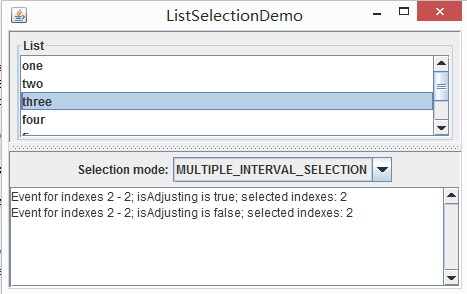Swing-JList选择事件监听器ListSelectionListener-入门
当JList中的元素被选中时,选择事件将被触发。对于JTable也是一样,你可以把它看做是多个并列的JList。那么,如果程序需要对该事件做出响应,需要以下步骤:
(1)创建一个实现了 ListSelectionListener的监听器;
(2)使用JList或selectionModel的addListSelectionListener添加监听器;
(3)在监听器的valueChanged方法添加响应代码。
在响应代码中需要注意的是getValueIsAdjusting值的判断。测试表明,每当我们进行选择时,valueChanged方法都会被激活多次,其中,在最后的鼠标操作中,getValueIsAdjusting值为false,而在一系列中间操作中,该值均为true。比如说,用鼠标连续划过一串元素时,会有一系列getValueIsAdjusting为true的valueChanged方法激活,且最后一次为false。而我们对选择事件的判定一般是以最后接触为准,因此这里对getValueIsAdjusting值进行一个判断。
常用方法如下:
getLeadSelectionIndex()
返回当前选中的元素的index。
getMinSelectionIndex()
返回选中的多个元素中index的最小值,如果选择为空在返回-1。
getMaxSelectionIndex()
原理同上。
isSelectedIndex(int index)
判断指定index是否被选中。
clearSelection()
清除选中。
getSelectedIndex()
返回被选中的所有元素中最小的index。
getSelectedIndices()
返回一个整型数组,包含被选中的所有index。
getSelectedValue()
返回被选中的,index最小的元素值。
getSelectedValues()
返回一个object数组,包含被选中的所有元素对象。
getSelectedValuesList()
返回一个objectList,包含被选中的所有元素对象。
下面的demo来自于ListSelectionDemo.java
/* * Copyright (c) 1995, 2008, Oracle and/or its affiliates. All rights reserved. * * Redistribution and use in source and binary forms, with or without * modification, are permitted provided that the following conditions * are met: * * - Redistributions of source code must retain the above copyright * notice, this list of conditions and the following disclaimer. * * - Redistributions in binary form must reproduce the above copyright * notice, this list of conditions and the following disclaimer in the * documentation and/or other materials provided with the distribution. * * - Neither the name of Oracle or the names of its * contributors may be used to endorse or promote products derived * from this software without specific prior written permission. * * THIS SOFTWARE IS PROVIDED BY THE COPYRIGHT HOLDERS AND CONTRIBUTORS "AS * IS" AND ANY EXPRESS OR IMPLIED WARRANTIES, INCLUDING, BUT NOT LIMITED TO, * THE IMPLIED WARRANTIES OF MERCHANTABILITY AND FITNESS FOR A PARTICULAR * PURPOSE ARE DISCLAIMED. IN NO EVENT SHALL THE COPYRIGHT OWNER OR * CONTRIBUTORS BE LIABLE FOR ANY DIRECT, INDIRECT, INCIDENTAL, SPECIAL, * EXEMPLARY, OR CONSEQUENTIAL DAMAGES (INCLUDING, BUT NOT LIMITED TO, * PROCUREMENT OF SUBSTITUTE GOODS OR SERVICES; LOSS OF USE, DATA, OR * PROFITS; OR BUSINESS INTERRUPTION) HOWEVER CAUSED AND ON ANY THEORY OF * LIABILITY, WHETHER IN CONTRACT, STRICT LIABILITY, OR TORT (INCLUDING * NEGLIGENCE OR OTHERWISE) ARISING IN ANY WAY OUT OF THE USE OF THIS * SOFTWARE, EVEN IF ADVISED OF THE POSSIBILITY OF SUCH DAMAGE. */ package Swing; /* * ListSelectionDemo.java requires no other files. */ import javax.swing.*; import javax.swing.event.*; import javax.swing.table.*; import java.util.*; import java.awt.*; import java.awt.event.*; public class ListSelectionDemo extends JPanel { JTextArea output; JList list; JTable table; String newline = "\n"; ListSelectionModel listSelectionModel; public ListSelectionDemo() { super(new BorderLayout()); String[] listData = { "one", "two", "three", "four", "five", "six", "seven" }; String[] columnNames = { "French", "Spanish", "Italian" }; list = new JList(listData); listSelectionModel = list.getSelectionModel(); listSelectionModel.addListSelectionListener( new SharedListSelectionHandler()); JScrollPane listPane = new JScrollPane(list); JPanel controlPane = new JPanel(); String[] modes = { "SINGLE_SELECTION", "SINGLE_INTERVAL_SELECTION", "MULTIPLE_INTERVAL_SELECTION" }; final JComboBox comboBox = new JComboBox(modes); comboBox.setSelectedIndex(2); comboBox.addActionListener(new ActionListener() { public void actionPerformed(ActionEvent e) { String newMode = (String)comboBox.getSelectedItem(); if (newMode.equals("SINGLE_SELECTION")) { listSelectionModel.setSelectionMode( ListSelectionModel.SINGLE_SELECTION); } else if (newMode.equals("SINGLE_INTERVAL_SELECTION")) { listSelectionModel.setSelectionMode( ListSelectionModel.SINGLE_INTERVAL_SELECTION); } else { listSelectionModel.setSelectionMode( ListSelectionModel.MULTIPLE_INTERVAL_SELECTION); } output.append("----------" + "Mode: " + newMode + "----------" + newline); } }); controlPane.add(new JLabel("Selection mode:")); controlPane.add(comboBox); //Build output area. output = new JTextArea(1, 10); output.setEditable(false); JScrollPane outputPane = new JScrollPane(output, ScrollPaneConstants.VERTICAL_SCROLLBAR_ALWAYS, ScrollPaneConstants.HORIZONTAL_SCROLLBAR_AS_NEEDED); //Do the layout. JSplitPane splitPane = new JSplitPane(JSplitPane.VERTICAL_SPLIT); add(splitPane, BorderLayout.CENTER); JPanel topHalf = new JPanel(); topHalf.setLayout(new BoxLayout(topHalf, BoxLayout.LINE_AXIS)); JPanel listContainer = new JPanel(new GridLayout(1,1)); listContainer.setBorder(BorderFactory.createTitledBorder( "List")); listContainer.add(listPane); topHalf.setBorder(BorderFactory.createEmptyBorder(5,5,0,5)); topHalf.add(listContainer); //topHalf.add(tableContainer); topHalf.setMinimumSize(new Dimension(100, 50)); topHalf.setPreferredSize(new Dimension(100, 110)); splitPane.add(topHalf); JPanel bottomHalf = new JPanel(new BorderLayout()); bottomHalf.add(controlPane, BorderLayout.PAGE_START); bottomHalf.add(outputPane, BorderLayout.CENTER); //XXX: next line needed if bottomHalf is a scroll pane: //bottomHalf.setMinimumSize(new Dimension(400, 50)); bottomHalf.setPreferredSize(new Dimension(450, 135)); splitPane.add(bottomHalf); } /** * Create the GUI and show it. For thread safety, * this method should be invoked from the * event-dispatching thread. */ private static void createAndShowGUI() { //Create and set up the window. JFrame frame = new JFrame("ListSelectionDemo"); frame.setDefaultCloseOperation(JFrame.EXIT_ON_CLOSE); //Create and set up the content pane. ListSelectionDemo demo = new ListSelectionDemo(); demo.setOpaque(true); frame.setContentPane(demo); //Display the window. frame.pack(); frame.setVisible(true); } public static void main(String[] args) { //Schedule a job for the event-dispatching thread: //creating and showing this application's GUI. javax.swing.SwingUtilities.invokeLater(new Runnable() { public void run() { createAndShowGUI(); } }); } class SharedListSelectionHandler implements ListSelectionListener { public void valueChanged(ListSelectionEvent e) { ListSelectionModel lsm = (ListSelectionModel)e.getSource(); //System.out.printf("LeadSelectionIndex is %s%n",lsm.getLeadSelectionIndex()); output.append("LeadSelectionIndex is " + lsm.getLeadSelectionIndex() + "\n"); int firstIndex = e.getFirstIndex(); int lastIndex = e.getLastIndex(); boolean isAdjusting = e.getValueIsAdjusting(); output.append("Event for indexes " + firstIndex + " - " + lastIndex + "; isAdjusting is " + isAdjusting + "; selected indexes:"); if (lsm.isSelectionEmpty()) { output.append(" <none>"); } else { // Find out which indexes are selected. int minIndex = lsm.getMinSelectionIndex(); int maxIndex = lsm.getMaxSelectionIndex(); for (int i = minIndex; i <= maxIndex; i++) { if (lsm.isSelectedIndex(i)) { output.append(" " + i); } } } output.append(newline); output.setCaretPosition(output.getDocument().getLength()); } } }
